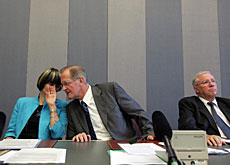
Labour accord campaign launched

The Swiss government has officially kicked off the campaign in favour of the extension of a labour accord to the European Union’s ten newest members.
The authorities reassured voters ahead of this September’s nationwide vote that Switzerland could handle the opening of its market to eastern European workers.
Economics Minister Joseph Deiss, Foreign Minister Micheline Calmy-Rey and Justice Minister Christoph Blocher said the extension of the bilateral accord on the free movement of workers was good for the economy, socially acceptable and necessary to maintain good relations with the European Union (EU).
Blocher, who is usually at loggerheads with his colleagues over Europe, said he personally thought it was worth casting a “yes” vote on September 25. The justice minister’s own rightwing Swiss People’s Party is split on the issue but recommended a “no” vote.
He added there was a slight risk there would be some pressure on the job market, but that it would depend on the economic situation in Switzerland and eastern Europe.
Safety measures
A series of measures to lessen the impact of a more open labour market have already been drawn up.
Until 2011, there will be restrictions on the number of workers from eastern Europe hired, local labour will be given priority and salaries will be checked.
These measures should help rein in immigration, fight wage dumping and allay fears of unemployment.
The government will also be allowed to set limits on immigration until 2014 if necessary. Voters will also get another chance to have their say in 2009, when parliament will decide whether to extend the accord.
Deiss touted the benefits of extending the accord, saying it would give Switzerland access to a market with 75 million consumers, which could benefit the hospitality, construction or health sectors.
Further opening the labour market could boost the Swiss gross national product by up to 0.5 per cent. Employers would benefit from a large pool of qualified and unqualified workers.
“We could suffer economically if the extension of the accord is rejected,” added the economics minister. In the event of a “no” vote, the EU might not agree to a differentiation between its members.
Brussels could apply the so-called guillotine clause, effectively ending all of its bilateral agreements with Switzerland. This could lead to a fall in investment, companies leaving the country and an increase in unemployment.
Schengen
A no vote could also prompt the EU to refuse Switzerland’s joining of the Schengen/Dublin agreement on security and asylum, which was approved by the Swiss in nationwide ballot in June.
Calmy-Rey also played up the economic benefits of extending the labour accord, adding that Switzerland had only a small domestic market. She said the government was well aware of the population’s fears and was taking them seriously.
Additional work inspectors are to be hired to ensure working conditions are respected, and collective bargaining agreements could be made compulsory if necessary. Foreign employers caught not respecting Swiss working conditions could also face sanctions.
Switzerland’s 26 cantons have also come out in favour of the extension. Josef Keller, president of the conference of cantonal economics directors, said the results since the labour market had been opened to citizens of the old 15 EU member states in 2002 had been positive.
Immigration had been kept in check, unemployment had not gone up and wage dumping was minimal.
swissinfo with agencies
The bilateral agreement between Switzerland and the EU on the free movement of people came into force on June 1, 2002.
This eases residence and working restrictions on Swiss and residents of the 15 old EU member states.
The agreement should also apply to the ten countries that joined the EU on May 1, 2004: Estonia, Latvia, Lithuania, Poland, Slovakia, Slovenia, the Czech Republic, Hungary, Cyprus and Malta.
The far-right Swiss Democrats are against the extension and collected enough signatures to force a nationwide vote on September 25.

In compliance with the JTI standards
More: SWI swissinfo.ch certified by the Journalism Trust Initiative




























You can find an overview of ongoing debates with our journalists here . Please join us!
If you want to start a conversation about a topic raised in this article or want to report factual errors, email us at english@swissinfo.ch.